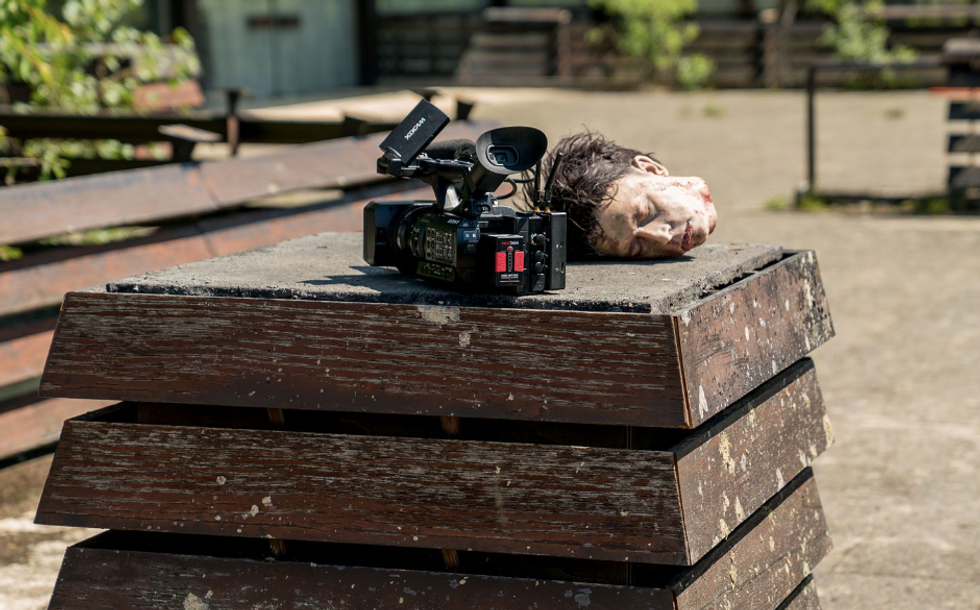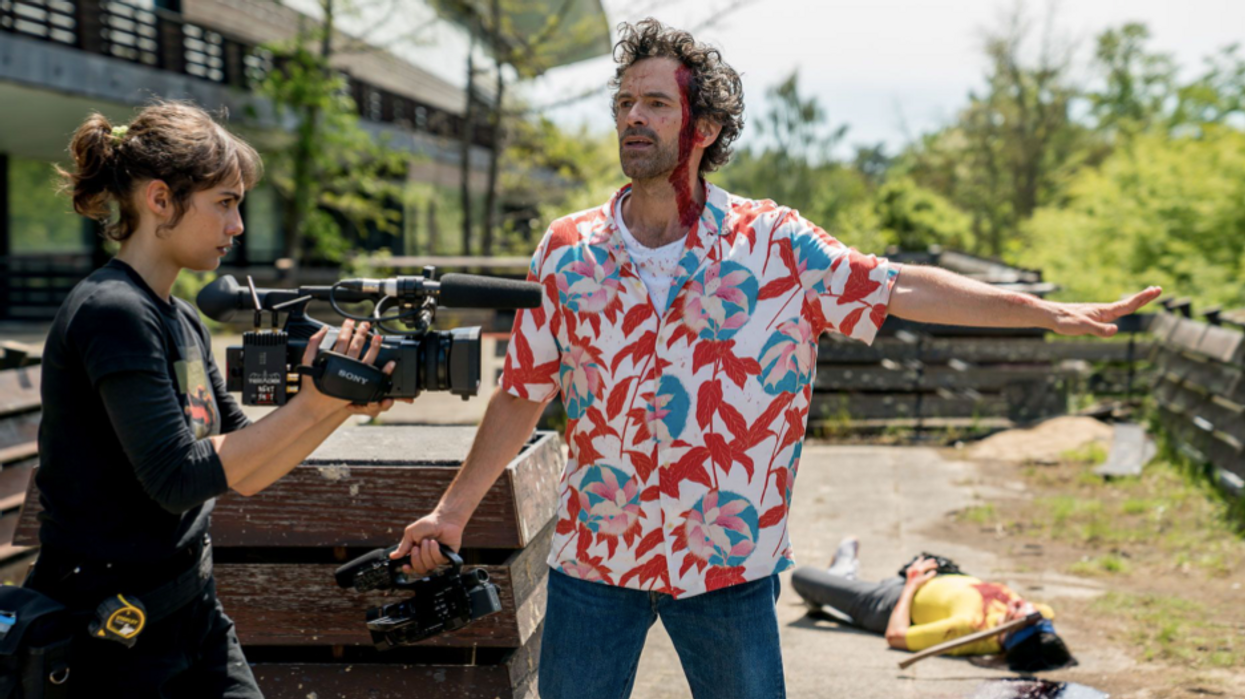It’s almost impossible to make a bad film on purpose.
The “bad films” most of us enjoy simply have some inescapable charm that can’t be manufactured. (Think The Room.) But Academy Award winner Michel Hazanavicius manages to capture the same charm, and the joy of creativity, in his new zany entertainment industry comedy, Final Cut.
Final Cut is a remake of the Japanese zombie film, One Cut of the Dead. Hazanavicius’ version, in an extremely meta twist, follows a French director (Romain Duris) adapting a popular Japanese zombie film. (Hazanavicius' real-life wife Bérénice Bejo and daughter Raïka also act in his film, playing the family of the fictional director. Where does reality even start?!)
The movie begins with the character’s version of that zombie film, which runs about 30 minutes in one continuous take. In the movie, it’s being broadcast live, adding another layer of wackiness to it all. Of course, the oner does not go fully to plan, resulting in dead air, awkward staging, and more mishaps.
Beyond being a technical achievement, the opening act does capture a certain level of schlock that most horror film fans will probably enjoy, although Hazanavicius, as you’ll see, might not entirely understand why. The beats are stilted, the action doesn’t always work, and the dialogue is sometimes meandering—but there’s blood and zombies, so I was definitely happy, at least.
The rest of FinalCut delves into the difficult pre-production of this fake movie and then shows the madcap shoot itself, which finds Duris’ character joining the cast at the last minute while also managing talent, cinematography, an unhappy producer, and a live audience.
All in all, it’s a movie about the love of filmmaking, a sense captured beautifully by the film’s close. That’s not necessarily new territory for Hazanavicius, who won an Oscar for The Artist. But to explore that art through a difficult B-movie shoot is definitely fresh, and aspiring filmmakers will probably identify with these harried characters.
Hazanavicius was kind enough to speak with us via Zoom ahead of the film’s release. Dive into his advice below.
Final Cut – Michel Hazanavicius – Official U.S. TrailerIn theaters July 14. The opening night selection of last year's Cannes Film Festival was this wacky horror comedy, a remake of ...
Editor’s note: The following conversation has been edited for length and clarity.
No Film School: So this is a little bit different from your past work. What attracted you to this project?
Michel Hazanavicius: Well, it's not that different actually because the topic of movies into movies, talking about people who make movies, it's not my first movie on this topic. My first movie was about ... the TV industry. I made a movie about ... The Artist, I'm sure you know, but also I made a movie about Jean-Luc Godard, and I made a few comedies. I'm more of a comedy director.
So the movie is at the intersection of a lot of things that I've done. But I never went to the zombie thing. It's not a zombie movie, it's a comedy about making movies. This is something I wanted to do [for] a while. At the very beginning of the [COVID-19] lockdown, I was working on an animation movie, the script was done, I started to draw and everything, and we were blocked with the financers because of COVID-19. So I had nothing to do, and I decided to work on the script that I had in mind.
Then I spoke to a producer about the rights to remake the original Japanese movie, One Cut of the Dead. He sent me the link, and I really so enjoyed the movie, and I thought it was so clever and such a cool playground for the thing I wanted to do, that I jumped on it.
I had a lot of fun. It was really challenging because it's not easy to shoot a 35-minute shot. The situation, the structure, everything was so fun, so I decided to jump on it.

NFS: I was going to ask about that 35-minute shot. Can you talk a little bit about the challenges of shooting that on the technical side?
Hazanavicius: This shot is challenging on many, many levels. The first one, of course, is the precision of everything. We had a chance to rehearse for five weeks and a half because we found the location very early in the preparation. Preparation is something that might be the most important part of making a movie. If you don't prepare well, you will pay for it on set. What you pay on set, you will pay in the cutting room, and you will pay it anyway.
We've been very lucky to find the location. Rehearsing with actors is really, really good advice because when we came on set, we knew each other and we were like a stage troupe in a way. Everybody was confident, and everybody gave everything, the best they could from the very, very beginning thanks to that. I was not used to rehearsing that much, but this is something I will keep as much as I can.
This was really challenging, of course, to do what you plan precisely and to have it for 35 minutes. This is always difficult. Another difficulty for this one, of course, and I don't talk about the blood, the stunts, all the choreography of the crew, and everything, this is part of the precision of a shot like that. Something which is, I don't know if it's challenging but it was for me, is when you do such a difficult shot, you want it to be perfect, you don't want it to be boring or with tempo, timing mistakes or everything. But I had to do it because it was part of the script.
So I had to resist, with all my temptation to put jokes, to make the movie funnier or to make the movie ... I had to keep that awkward flavor. Sometimes it's not funny in a way that I'm making jokes, it's just weird. I had to respect it because it was needed for the script and for the third act. When you put everything together, you put the whole picture together in the third act, it had to be acquired in the first act. So that was very challenging to resist of the temptation of doing something better.

NFS: As hard as you may have tried to make it really bad, I was having a really good time with it. How do you lean into making it bad but still enjoyable? What's the challenge of making something that's purposefully bad?
Hazanavicius: “Enjoyable” might not be the right word, but I try to keep interesting. So with the action, sometimes with the music, sometimes with jokes, to create that sensation that there's something behind what we are watching. Actors looking at the camera, actors talking to the camera at one point, and the other actors looking at each other, and we can feel that there is something, and we will have the key to everything later.
My only point was how to keep the interest of the audience. I had these tools with me, action, music, awkwardness, visible awkwardness, and some little jokes, something that can be funny anyway, or things that are so ... you are so not supposed to do something like this, that the audience is forced to think that there is something behind.
But still, in France, some people commented on forums, saying, "I've never seen such a bad movie. I went out of the theater after 20 minutes. I've never seen such a shitty movie."
NFS: Oh, no.
Hazanavicius: No, no. But it was fun. I mean, I really enjoy that kind of criticism.

NFS: As I mentioned, I think that one thing that this movie captures so well is just the joy of creativity and coming together. I really like the finale. Maybe the characters think the end product is not very good, but they're all working together. Did anything in the film relate to your own experiences as a filmmaker, in terms of those difficulties and those frustrations?
Hazanavicius: Yeah, I mean, there's something that I recognized in the original movie, the Japanese movie, that this is something that I think and say for a long time when I talk with journalists, for example, and I say, "You think we do bad movies, but we never do bad movies. We do the best we can. In the end, when it's done, you have the right to say it's bad, but this is not what we are doing when we are making the movies. We are not making bad movies." I've never heard a director say, "Well, I'm making a bad movie now. The actors are really, really bad. I'm so happy." So we do our best to make the best movies we can.
This is something I really love in that movie. You start by judging what you watch and you say, "This is really lame." Then, the story goes forward, and you realize that not only do you not judge anymore the movie, but you judge yourself for having judged what you were saying. Because you realize that the important thing was not here, something else was happening. What was happening is just making movies and creating cinema.
It was another difficulty of doing a remake of a movie because the original is, first, it was a festival darling, made with such a low budget. Doing it in a more professional way, even if it's not an expensive movie, but with well-known actors ... I had different tools. I couldn't pretend we were a cheap, cheap, cheap movie. I had to do something else.
But I wanted to keep that energy that you were talking about. I've been lucky because it was the end of the lockdown, so we had this energy. Thanks to the rehearsal, I think we really kept that energy that we can see in the movie and which is part of the story.

NFS: It's a large question, but what advice would you give to aspiring filmmakers?
Hazanavicius: Well, I always do that kind of joke—but it's not a joke—and my only advice is don't forget to be lucky. You really need luck.
I mean, all the rest you know, that you have to work a lot, you have to learn how to write, you have to [have] interest for a lot of things. Life is not just cinema, you have to [have] interest of painting, music, art, life, people you love, people you hate. You have to observe people.
But all this works for one person, everybody will do his own cuisine. But at the end, you really have to be lucky. When the luck comes by you, you have to catch it.














